C Major Entertainment
422 products
-
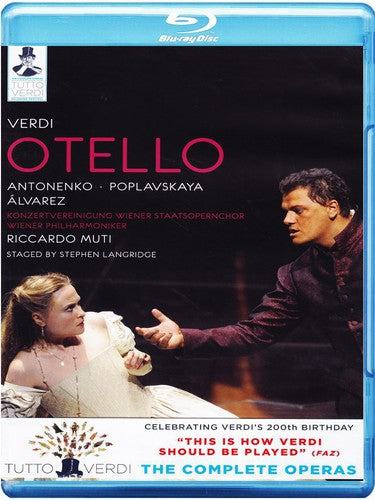
-
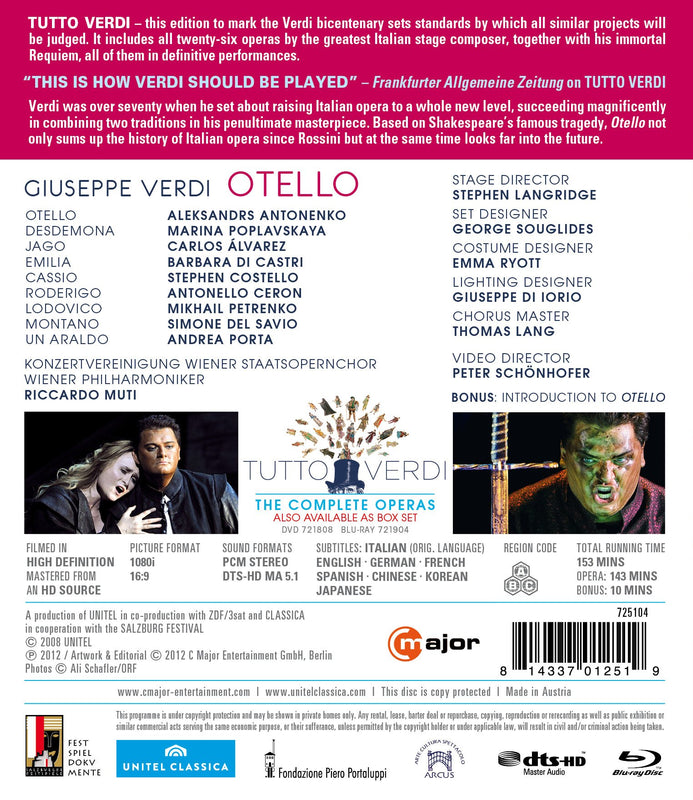
-
![Verdi: Otello / Antonenko, Ceron, Poplavskaya, Alvarez, Muti [blu-ray]](//arkivmusic.com/cdn/shop/files/2248480.jpg?v=1749392527&width=800) {# optional: put hover video/second image here positioned absolute; inset:0 #}
On SaleC Major Entertainment
{# optional: put hover video/second image here positioned absolute; inset:0 #}
On SaleC Major EntertainmentVerdi: Otello / Antonenko, Ceron, Poplavskaya, Alvarez, Muti [blu-ray]
Note: This Blu-ray Disc is only playable on Blu-ray Disc players and not compatible with standard DVD players. Also available on standard...
June 25, 2013$66.99$50.99 -
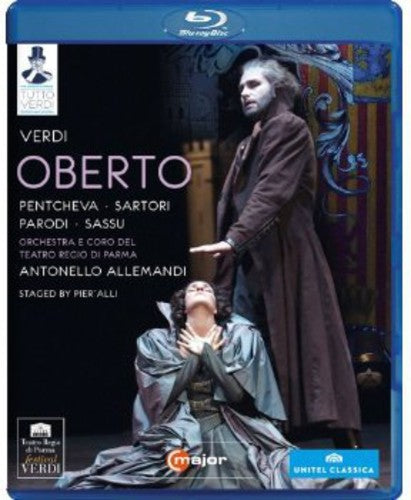
-
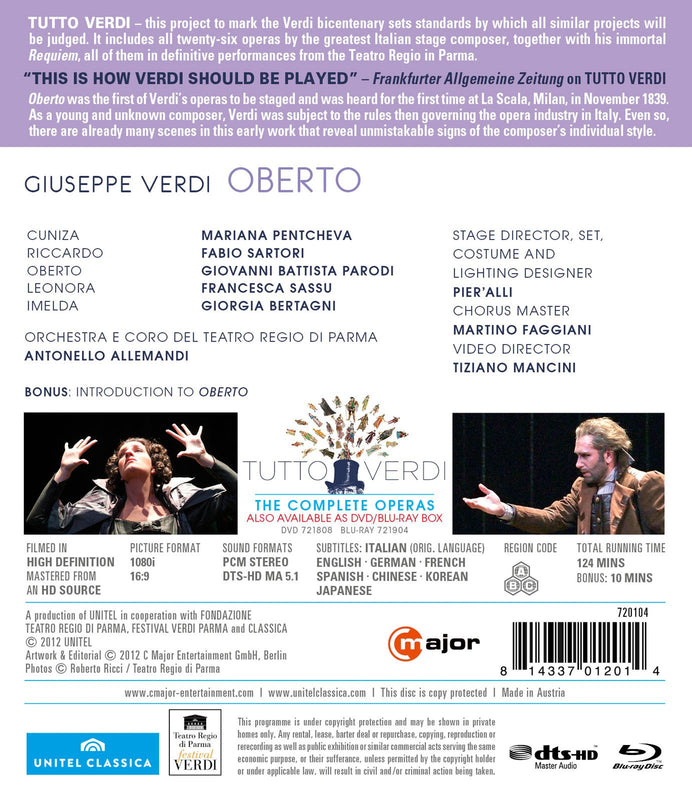
-
![Verdi: Oberto / Allemandi, Pentcheva, Sartori, Parodi, Teatro Regio Di Parma [blu-ray]](//arkivmusic.com/cdn/shop/files/2042899.jpg?v=1749393293&width=800) {# optional: put hover video/second image here positioned absolute; inset:0 #}
C Major Entertainment
{# optional: put hover video/second image here positioned absolute; inset:0 #}
C Major EntertainmentVerdi: Oberto / Allemandi, Pentcheva, Sartori, Parodi, Teatro Regio Di Parma [blu-ray]
This Blu-ray Disc is only playable on Blu-ray Disc players and not compatible with standard DVD players. Also available on standard DVD...
$66.99September 25, 2012 -
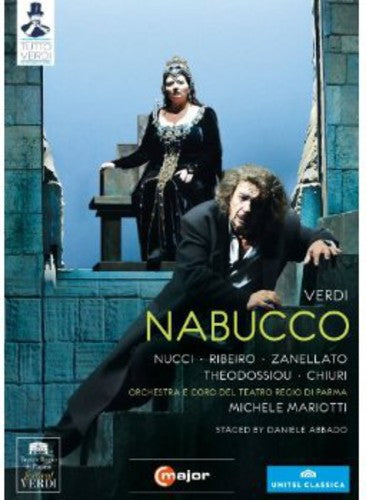
-
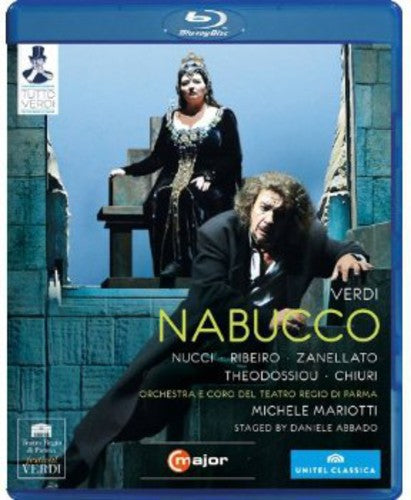
-
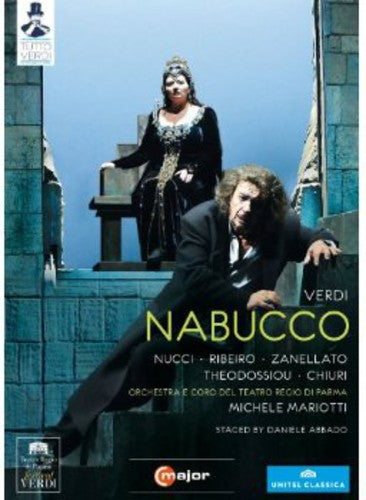 {# optional: put hover video/second image here positioned absolute; inset:0 #}
On SaleC Major Entertainment
{# optional: put hover video/second image here positioned absolute; inset:0 #}
On SaleC Major EntertainmentVerdi: Nabucco / Nucci, Ribeiro, Zanellato, Mariotti
Also available on Blu-ray On the occasion of the 200th birthday of Giuseppe Verdi, Teatro Regio di Parma and Unitel Classica have...
September 25, 2012$45.99$22.98 -
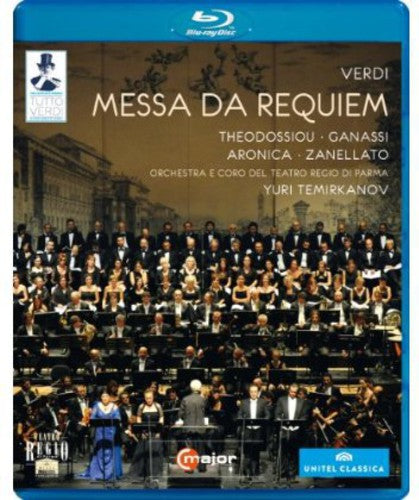
-
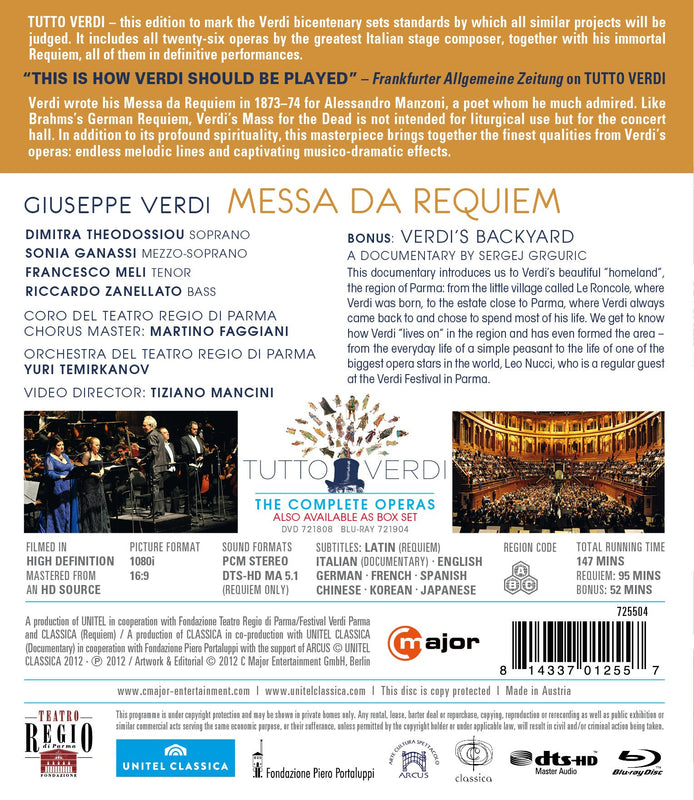
-
![Verdi: Messa Da Requiem / Theodossiou, Ganassi, Aronica, Zanellato, Temirkanov [blu-ray]](//arkivmusic.com/cdn/shop/files/2309759.jpg?v=1758294435&width=800) {# optional: put hover video/second image here positioned absolute; inset:0 #}
On SaleC Major Entertainment
{# optional: put hover video/second image here positioned absolute; inset:0 #}
On SaleC Major EntertainmentVerdi: Messa Da Requiem / Theodossiou, Ganassi, Aronica, Zanellato, Temirkanov [blu-ray]
Note: This Blu-ray Disc is playable only on Blu-ray Disc players, and not compatible with standard DVD players. Also available on standard...
September 24, 2013$37.99$18.99 -
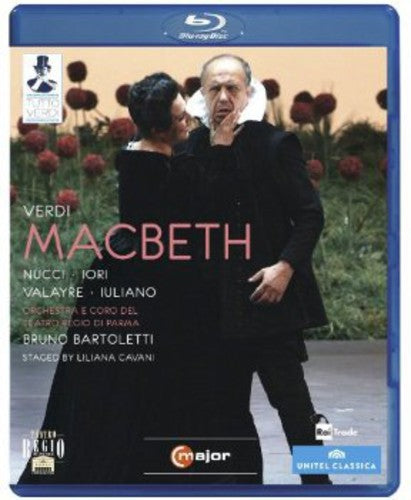
-
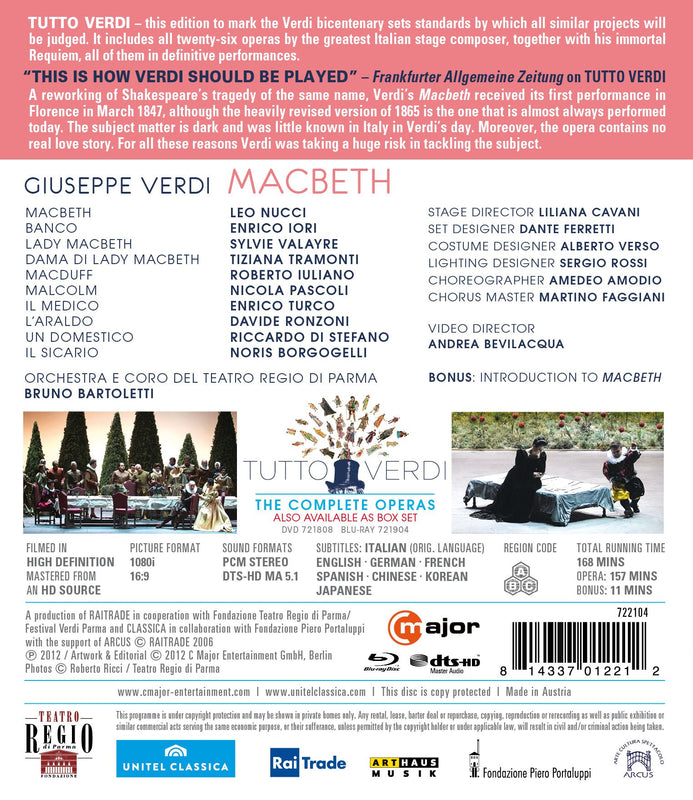
-
![Verdi: Macbeth / Nucci, Valayre, Bartoletti, Tramonti, Borgogelli [blu-ray]](//arkivmusic.com/cdn/shop/files/2109027.jpg?v=1749390647&width=800) {# optional: put hover video/second image here positioned absolute; inset:0 #}
C Major Entertainment
{# optional: put hover video/second image here positioned absolute; inset:0 #}
C Major EntertainmentVerdi: Macbeth / Nucci, Valayre, Bartoletti, Tramonti, Borgogelli [blu-ray]
This Blu-ray Disc is only playable on Blu-ray Disc players and not compatible with standard DVD players. Also available on standard DVD...
$66.99January 29, 2013 -

-

-
![Verdi: Luisa Miller / Renzetti, Surian, Franci, Alvarez, Cedolins [blu-ray]](//arkivmusic.com/cdn/shop/files/2136964.jpg?v=1762403875&width=800) {# optional: put hover video/second image here positioned absolute; inset:0 #}
On SaleC Major Entertainment
{# optional: put hover video/second image here positioned absolute; inset:0 #}
On SaleC Major EntertainmentVerdi: Luisa Miller / Renzetti, Surian, Franci, Alvarez, Cedolins [blu-ray]
VERDI Luisa Miller • Donato Renzetti, cond; Fiorenza Cedolins (Luisa); Marcelo Alvarez (Rodolfo); Leo Nucci (Miller); Giorgio Surian (Count Walter); Rafal Siwek...
February 26, 2013$37.99$18.99 -
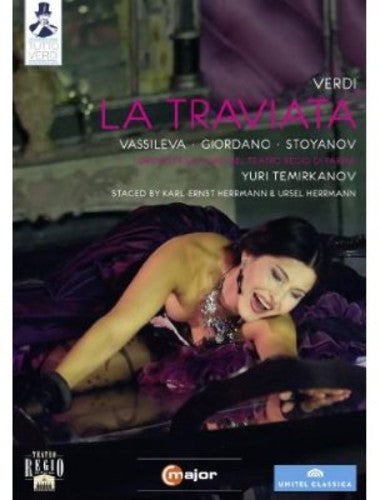
-
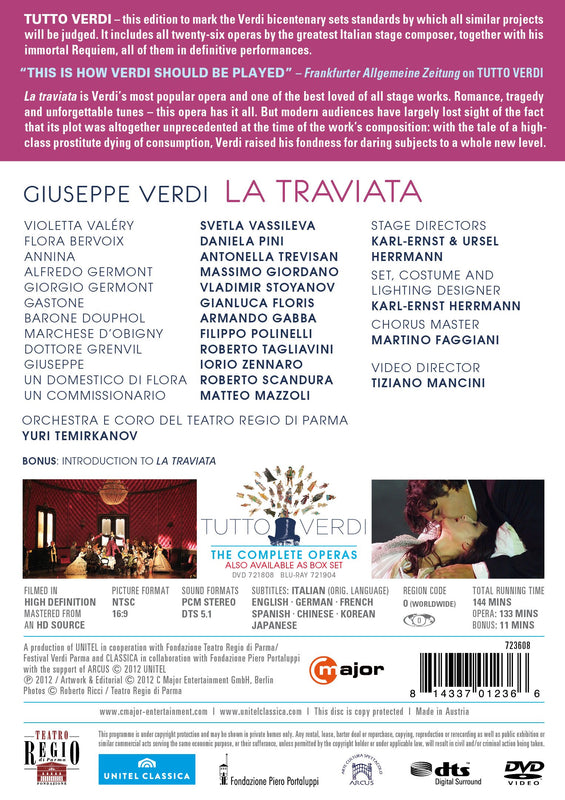
-
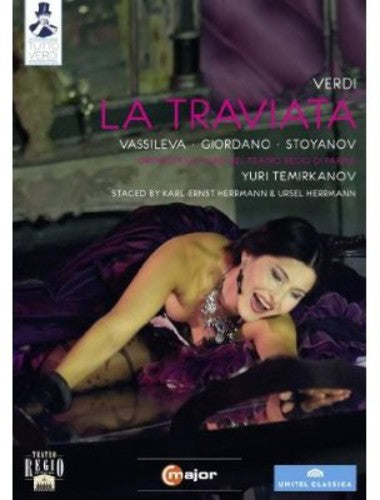 {# optional: put hover video/second image here positioned absolute; inset:0 #}
On SaleC Major Entertainment
{# optional: put hover video/second image here positioned absolute; inset:0 #}
On SaleC Major EntertainmentVerdi: La Traviata / Temirkanov, Vassileva, Trevisan, Pini, Giordano, Stoyanov, Tagliavini
Also available on Blu-ray Giuseppe Verdi LA TRAVIATA Violetta Valéry – Svetla Vassileva Flora Bervoix – Daniela Pini Annina – Antonella Trevisan...
April 30, 2013$26.99$13.49 -
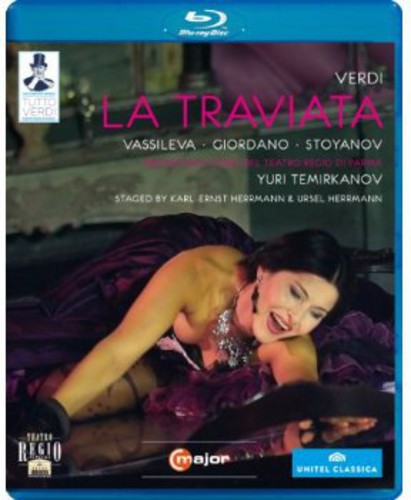
-
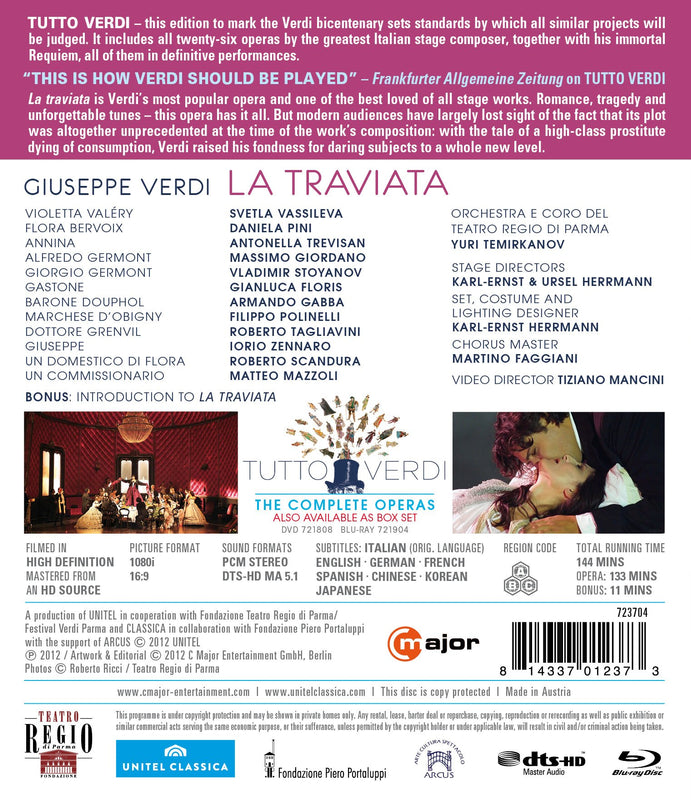
-
![Verdi: La Traviata / Temirkanov, Vassileva, Trevisan, Pini, Giordano, Stoyanov [blu-ray]](//arkivmusic.com/cdn/shop/files/2165942.jpg?v=1749386513&width=800) {# optional: put hover video/second image here positioned absolute; inset:0 #}
C Major Entertainment
{# optional: put hover video/second image here positioned absolute; inset:0 #}
C Major EntertainmentVerdi: La Traviata / Temirkanov, Vassileva, Trevisan, Pini, Giordano, Stoyanov [blu-ray]
This Blu-ray Disc is only playable on Blu-ray Disc players and not compatible with standard DVD players. Also available on standard DVD...
$66.99April 30, 2013 -
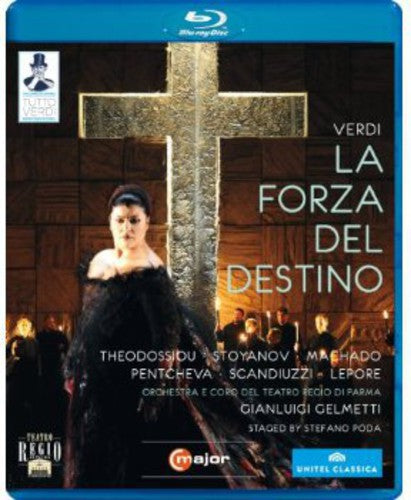
-
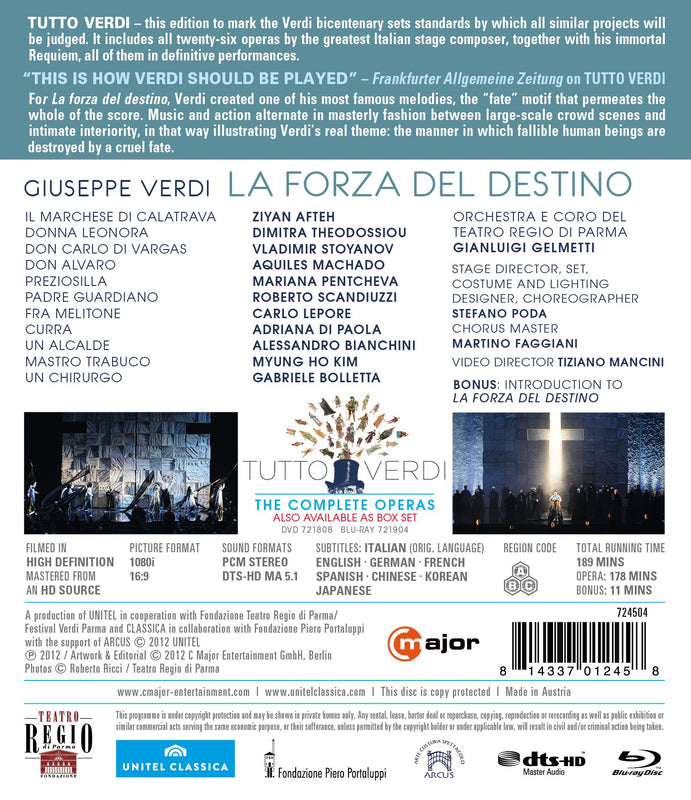
-
![Verdi: La Forza Del Destino / Theodossiou, Stoyanov, Machado, Gelmetti [blu-ray]](//arkivmusic.com/cdn/shop/files/2225667.jpg?v=1749390870&width=800) {# optional: put hover video/second image here positioned absolute; inset:0 #}
C Major Entertainment
{# optional: put hover video/second image here positioned absolute; inset:0 #}
C Major EntertainmentVerdi: La Forza Del Destino / Theodossiou, Stoyanov, Machado, Gelmetti [blu-ray]
Note: This Blu-ray Disc is only playable on Blu-ray Disc players, and not compatible with standard DVD players Also available on standard...
$37.99May 28, 2013 -

-

-
 {# optional: put hover video/second image here positioned absolute; inset:0 #}
On SaleC Major Entertainment
{# optional: put hover video/second image here positioned absolute; inset:0 #}
On SaleC Major EntertainmentVerdi: La Forza Del Destino / Stimme, Licitra, Mehta, Wiener Staatsoper
Also available on Blu-ray “The cast is a dream team,” wrote the Financial Times after the premiere of this production of Verdi’s...
February 23, 2018$45.99$22.98 -
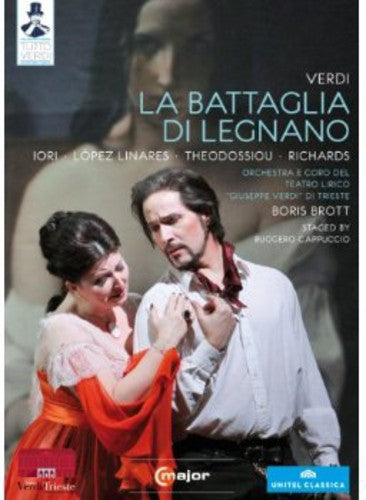
-
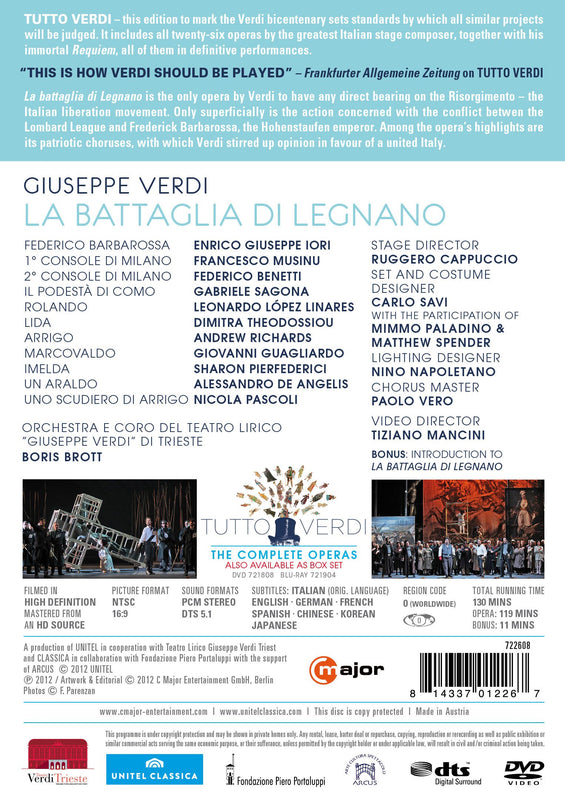
-
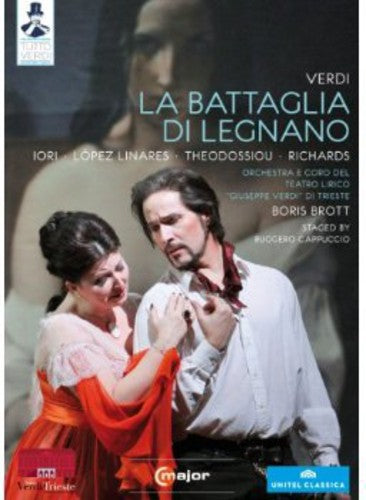 {# optional: put hover video/second image here positioned absolute; inset:0 #}
C Major Entertainment
{# optional: put hover video/second image here positioned absolute; inset:0 #}
C Major EntertainmentVerdi: La Battaglia Di Legnano / Brott, Theodossiou, Linares, Musinu, Guagliardo
Also available on Blu-ray Giuseppe Verdi LA BATTAGLIA DI LEGNANO Federico Barbarossa – Enrico Giuseppe Iori Primo console di Milano – Francesco...
$26.99February 26, 2013 -
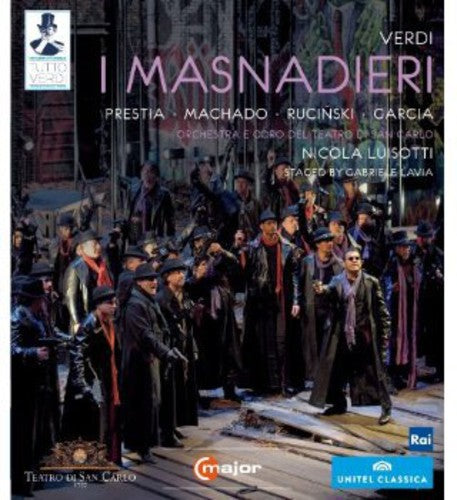
-
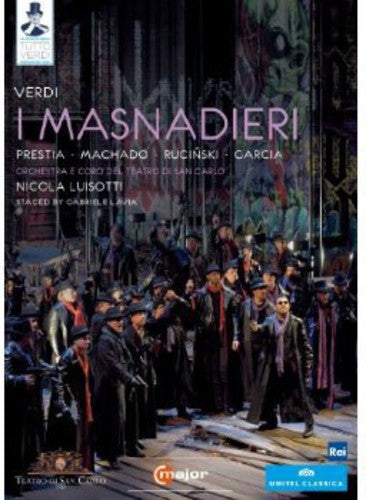
-
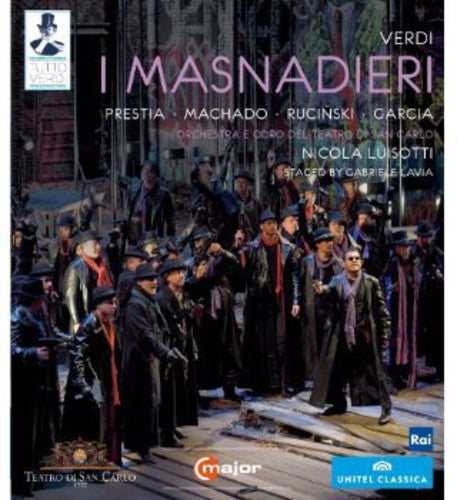 {# optional: put hover video/second image here positioned absolute; inset:0 #}
C Major Entertainment
{# optional: put hover video/second image here positioned absolute; inset:0 #}
C Major EntertainmentVerdi: I Masnadieri / Luisotti Prestia, Machado, Rucinski
Also available on Blu-ray Verdi composed I masnadieri, based on a play by Schiller, for Her Majesty’s Theatre, the Haymarket, in London....
$35.99January 29, 2013 -
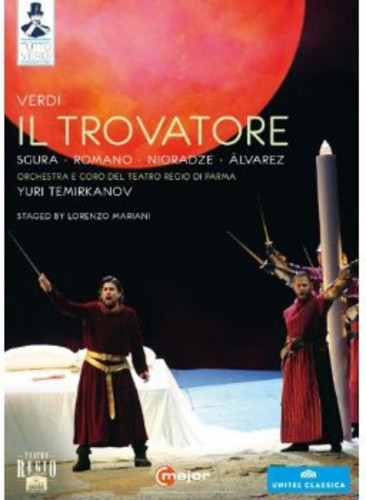
-
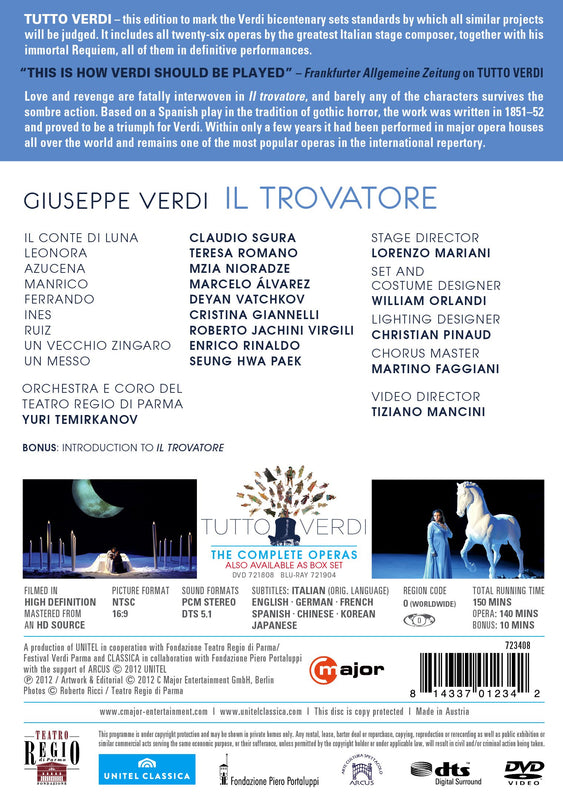
-
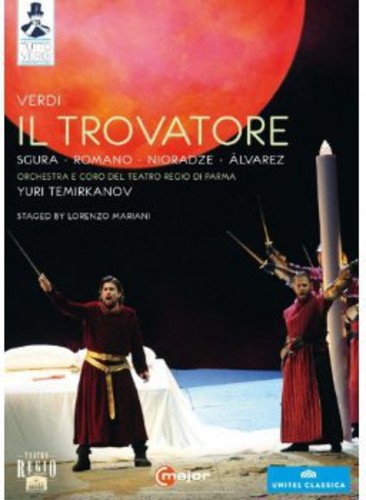 {# optional: put hover video/second image here positioned absolute; inset:0 #}
On SaleC Major Entertainment
{# optional: put hover video/second image here positioned absolute; inset:0 #}
On SaleC Major EntertainmentVerdi: Il Trovatore / Sgura, Romano, Nioradze, Alvarez, Temirkanov
Also available on Blu-ray Giuseppe Verdi IL TROVATORE Il conte di Luna – Claudio Sgura Leonora – Teresa Romano Azucena – Mzia...
March 26, 2013$26.99$13.49 -
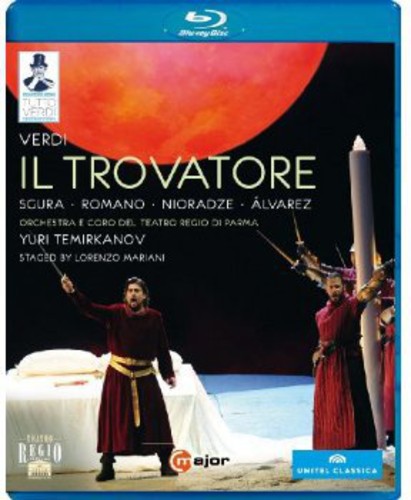
-
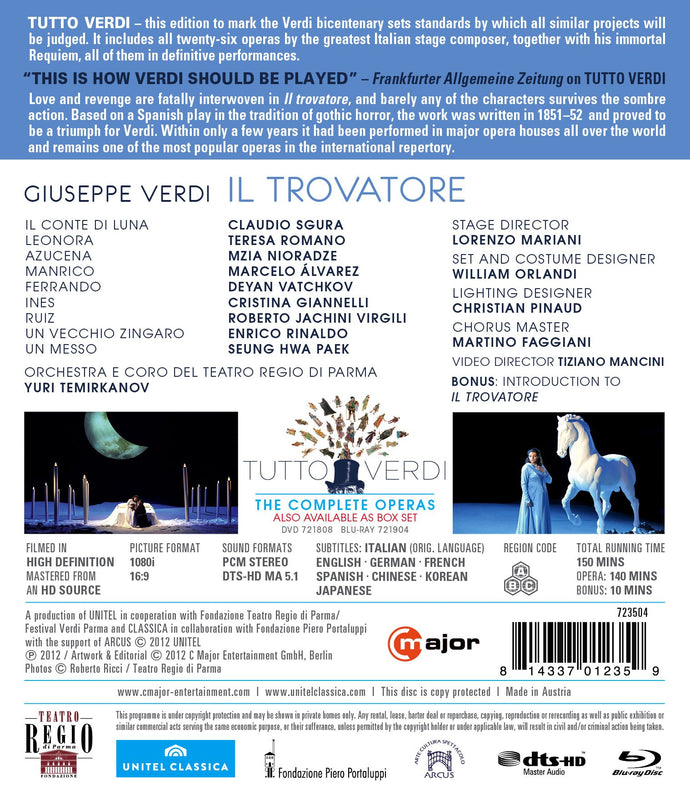
-
![Verdi: Il Trovatore / Sgura, Romano, Nioradze, Alvarez, Temirkanov [blu-ray]](//arkivmusic.com/cdn/shop/files/2142755.jpg?v=1749393420&width=800) {# optional: put hover video/second image here positioned absolute; inset:0 #}
On SaleC Major Entertainment
{# optional: put hover video/second image here positioned absolute; inset:0 #}
On SaleC Major EntertainmentVerdi: Il Trovatore / Sgura, Romano, Nioradze, Alvarez, Temirkanov [blu-ray]
Note: This Blu-ray Disc is playable only on Blu-ray Disc players, and not compatible with standard DVD players. Also available on standard...
March 26, 2013$37.99$18.99 -

-

-
 {# optional: put hover video/second image here positioned absolute; inset:0 #}
On SaleC Major Entertainment
{# optional: put hover video/second image here positioned absolute; inset:0 #}
On SaleC Major EntertainmentVerdi: I Lombardi Alla Prima Crociata / Callegari, Theodossiou, De Biasio, Pertusi
Also available on Blu-ray The foremost voices in Verdi interpretation today have gathered in the historic Teatro Regiotoday have gathered in the...
October 30, 2012$35.99$22.98
Verdi: Otello / Antonenko, Ceron, Poplavskaya, Alvarez, Muti [blu-ray]
Also available on standard DVD
As part of C Major’s TUTTO VERDI project, this live-production of Otello from the 2008 Salzburg Festival features Ricardo Muti – one of the world’s best Verdi conductors – and the Vienna Philharmonic Orchestra. The cast includes young singers Marina Poplavskaya and Stephen Costello. The stage production is from Stephen Langridge, known from his work at London´s Royal Festival Hall, in Tokyo and Bregenz.
Giuseppe Verdi
OTELLO
(Blu-ray Disc Version)
Otello – Aleksandrs Antonenko
Desdemona – Marina Poplavskaya
Jago – Carlos Álvarez
Emilia – Barbara Di Castri
Cassio – Stephen Costello
Roderigo – Antonello Ceron
Lodovico – Mikhail Petrenko
Montano – Simone del Savio
Un araldo – Andrea Porta
Salzburg Festival Children’s Chorus
Vienna State Opera Chorus
(chorus master: Thomas Lang)
Salzburg Mozarteum Orchestra
Vienna Philharmonic Orchestra
Riccardo Muti, conductor
Stephen Langridge, stage director
George Souglides, set designer
Emma Ryott, costume designer
Giuseppe di Iorio, lighting designer
Recorded live at the Salzburg Festival, 5–10 August 2008
Bonus:
- Introduction to Otello
Picture format: 1080i High Definition
Sound format: PCM Stereo / DTS-HD Master Audio 5.1
Region code: 0 (worldwide)
Subtitles: Italian, English, German, French, Spanish, Chinese, Korean, Japanese
Running time: 143 mins (opera) + 10 mins (bonus)
No. of Discs: 1 (Blu-ray)
Verdi: Oberto / Allemandi, Pentcheva, Sartori, Parodi, Teatro Regio Di Parma [blu-ray]
Also available on standard DVD
Oberto was the first of Verdi’s operas to be staged and was heard for the first time at La Scala, Milan, in November 1839. As a young and unknown composer, Verdi was subject to the rules then governing the opera industry in Italy. Even so, there are already many scenes in this early work that reveal unmistakable signs of the composer’s individual style.
Cuniza – Mariana Pentcheva
Riccardo – Fabio Sartori
Oberto – Giovanni Battista Parodi
Leonora – Francesca Sassu
Imelda – Giorgia Bertagni
Teatro Regio di Parma Chorus and Orchestra
(chorus master: Martino Faggiani)
Antonello Allemandi, conductor
Pier’Alli, stage director, set, costume and lighting designer
Recorded live from the Teatro Regio di Parma, 2007
Bonus:
- Introduction to Oberto
Picture format: NTSC 16:9
Sound format: PCM Stereo / DTS 5.1
Region code: 0 (worldwide)
Subtitles: Italian, English, German, French, Spanish, Chinese, Korean, Japanese
Booklet notes: English, German, French
Running time: 124 mins (opera) + 10 mins (bonus)
No. of Discs: 1 (Blu-ray)
R E V I E W:
VERDI Oberto, conte di San Bonifacio • Antonello Allemandi, cond; Fabio Sartori (Riccardo); Mariana Pentcheva (Cuniza); Francesca Sassu (Leonora); Giovanni Battista Parodi (Oberto); Giorgia Bertagni (Imelda); Teatro Regio di Parma O & Ch • C MAJOR 720104 (Blu-ray disc: 124:00 opera, 10:00 bonus) Live: Busseto 2007
The genesis of Giuseppe Verdi’s first opera, Oberto Conte di San Bonifacio is shrouded in some obscurity, but most researchers now agree the young composer probably had nearly three years to write, rewrite, and improve his score. The text itself likely underwent radical surgery with the assistance of La Scala house poet, Temistocle Solera, and Verdi no doubt would have been forced to make some changes to accommodate that as well as rewriting passages to better suit his singers and even adding a new number or two (the quartet in act II is for certain a last minute addition) The time and care Verdi took is evident, the score is full of good tunes, felicitous choruses, and nice orchestral music. If, at times, it sounds like an imitation of Rossini, Bellini, and Donizetti, at least it is a well-crafted imitation. For Verdi fans especially, Oberto is also highly evocative of the much better works to come.
The libretto sadly, detracts rather than enhances the Verdi score. Leonora (soprano) has earlier been seduced and abandoned by Riccardo (tenor) and is seeking retribution as is her papa Oberto (bass), the exiled ex-ruler of the country. After reconciling with one another, father and daughter go seeking the Princess Cuniza (mezzo), Riccardo’s new girlfriend and bride-to-be. Cuniza is aghast at her intended’s vile behavior and sympathetic with Leonora’s plight. (Librettist Solera apparently didn’t get out much with the ladies; Cuniza’s reaction seems quite unlikely.) She orders Riccardo to go back to Leonora and he pretends to agree, but meanwhile Oberto is still spoiling for a fight to restore his daughter’s besmirched honor. The old man and the young gallant fight a duel with long swords and Oberto is killed (better besmirched than be stuck). The shamed Riccardo takes himself off to exile, abandoning both women this time, leaving the girls to sing the big finale by themselves. Cuniza wrings her hands while the grief stricken and heartbroken Leonora says she is going off to a nunnery. Rather a depressing ending, but Verdi scored a modest success with the work despite it, first at La Scala in Milan in 1839, then in other venues up and down the Italian peninsula. Oberto’s success gave a needed boost to Verdi’s confidence and no doubt strengthened his determination to go forward with what was to become a long and remarkable career.
This production is Set No. 1 in the Tutto Verdi project of the Teatro Regio from Parma in partnership with C Major. The goal is to stage and video record all of Verdi’s 26 operas and his Requiem in the Blu-ray format in honor of the great Italian composer’s 200th birthday this year. Most, if not all of the operas are already complete, staged at multiple venues in and around Parma. This Oberto is staged in the small, 300 seat theater in Busetto, Verdi’s hometown. As with Mozart’s Salzburg, the municipal authorities in Busetto prove much more supportive now that the composer is dead and famous than they were when he was actually living there. Staging in the Busetto theater is minimal, generic back and side drops are employed to vaguely suggest a palace setting. For scenes set in the woods the stage is dark. Costumes are attractive but more evocative of the 19th century than the 13th. The stage is so small the Parma chorus actually must spill over into the first row of boxes on either side. Director Pier’alli presents many of the musical set pieces as individual tableaus, starting and stopping the music between many of them. This tactic chops the score of course, it is not what Verdi intended. It would be a disaster to do this in later Verdi where the musical transitions become quite complex and pieces of musical artistry in themselves, but in this early work Verdi’s transitions are rudimentary and sometimes missing entirely, so interrupting the flow in this manner is merely a distraction. Pier’alli also has cast and chorus engaging in some kind of stylized movements and gestures, particularly with hands and arms, a bit like the Japanese Kabuki performers. It is unclear to me exactly what the director is trying to accomplish, but the result is to make interactions between characters look stiff and unnatural, draining away any dramatic impetus from the story.
There is, hard to believe, a second video of Oberto available on DVD from the Opus Arte label and reviewed in these pages by Lynn René Bayley in Fanfare 31:5. Recorded in Bilbao in 2007, that production, staged by Ignacio Garcia provides a bit more natural, if still stylized sets, and more of them. Costumes are more in keeping with period and the acting is more natural and more dramatically viable. Reviewer Bayley fails to inform us that Leonora stabs herself to death in the Bilbao finale, not as written in the libretto, but probably a more appropriate ending. Round 1 then, to Bilbao. Musically, it’s a different story. Except for bass Ildar Abdrazakov in the title role, the singing is pretty mediocre on the Bilbao set. Abdrazakov sings well but cannot match the rich deep vocal quality of Giovanni Battista Parodi on this set. Parodi’s excellent contribution is not only notable in his solo arias but in the satisfying bass line he provides in Verdi’s duets and ensembles. The C Major tenor, Italian Fabio Sartori, also clearly takes the honors in the role of Riccardo. He and his Bilbao counterpart Carlo Ventri both could afford to shed a few kilos, and neither exhibits much in the way of acting skills, but Sartori provides the superior tenor instrument; he is rock solid in intonation and his top notes are thrilling. The ladies on the two sets are more closely matched in vocal quality and technique, but I would give the definite edge to the C Major pair of Bulgarian soprano Francesca Sassu and mezzo Mariana Pentcheva. All of the C Major singers also display an ability to sing the florid bel canto style music Verdi supplies in abundance here, although Cuniza’s pyrotechnic aria in act II is not performed particularly well by either lady. In my opinion, the nod also has to go to the Parma chorus and orchestra under the direction of Antonello Allemandi. Both groups seem to be able to produce a fuller, richer sound with approximately the same limited forces as used in Bilbao. The overture, one of Verdi’s best pieces here, is played particularly well in the Busetto pit. Round 2 then, must go to the new C Major set, evening up the score. But then there is the matter of the high definition picture and audio quality available on the C Major Blu-ray disc. Two notable audio recordings of Oberto exist, one on Philips and one on Orfeo, but both currently are out of print (still available from Internet resellers). Some so-called authorities claim this opera is for Verdi completists only. I think it is better than that. Take your pick then, if you want a copy of Oberto. Perhaps the definitive recorded version is yet to be made, but until then I will put this C Major Blu-ray on my shelf.
FANFARE: Bill White
Verdi: Nabucco / Nucci, Ribeiro, Zanellato, Mariotti
On the occasion of the 200th birthday of Giuseppe Verdi, Teatro Regio di Parma and Unitel Classica have joined forces to create a truly unique project – for the first time ever, and just in time for the composer’s 200th brithday, Verdi’s Operatic oeuvre, which comprises the labour of more than 50 years, will be available in High Definition and Surround Sound. All of the composer’s 26 Operas, as well as the Requiem – which is closely related to the Operas – will be performed and audio-visually recorded in and around Parma, and released on DVD and Blu-ray. Verdi’s Nabucco is presented here staged by Daniele Abbado. Bonus features include a 10 minute introduction of the opera.
"As last year, the musical direction was entrusted to Michele Mariotti, whose immersion in the score has deepened further allowing him to provide a very remarkable reading. Simply seeing the warmth that all the singers offered him from the stage was enough realize that this young maestro has managed to develop genuine team work producing very good results. His interpretation of “Va pensiero” was unique: a very personal reading, slow, solemn and moving from which the Teatro Regio Chorus rewarded him with spectacular and truly unusual performance. I had never heard a chorus singing this passage at such a pianissimo complete with real diminuendos. This only can be done by an exceptional choir... Similarly, the music from of the Teatro Regio Orchestra was everything to be expected from this excellent group. The protagonist Nabucco was Leo Nucci, the Verdi Festival’s true star... Abigaille was the Greek soprano Dimitra Theodossiou... The cheers she received were not even true cheers, but spectacular screams, so loud that it seemed as if her life might be at risk. At her final bow she was almost completely covered by flowers, thrown from the upper floors, with none left at all for any other artist... As might be expected there was a completely full house for this almost gala performance. 'Va pensiero' was encored at popular request and at the final bows, there were triumphs for Leo Nucci, Dimitra Theodossiou and Michele Mariotti." -- José M. Irurzun, MusicWeb International reviewing a live performance of this production
Nabucco – Leo Nucci
Ismaele – Bruno Ribeiro
Zaccaria – Riccardo Zanellato
Abigaille – Dimitra Theodossiou
Fenena – Annamaria Chiuri
Il Gran Sacerdote di Belo – Alessandro Spina
Abdallo – Mauro Buffoli
Anna – Cristina Giannelli
Teatro Regio di Parma Chorus and Orchestra
(chorus master: Martino Faggiani)
Michele Mariotti, conductor
Daniele Abbado, staging
Caroline Lang, stage director
Luigi Perego, set and costume designer
Valero Alfier, lighting designer
Recorded live from the Teatro Regio di Parma, 2009
Bonus:
- Introduction to Nabucco
Picture format: NTSC 16:9
Sound format: PCM Stereo / DTS 5.1
Region code: 0 (worldwide)
Subtitles: Italian, English, German, French, Spanish, Chinese, Korean, Japanese
Running time: 137 mins (opera) + 10 mins (bonus)
No. of DVDs: 1
Verdi: Messa Da Requiem / Theodossiou, Ganassi, Aronica, Zanellato, Temirkanov [blu-ray]
Also available on standard DVD
Recorded live from the Teatro Regio di Parma, 8 October 2011
Bonus:
- Verdi’s Backyard – A documentary by Sergej Grguric
Picture format: 1080i High Definition
Sound format: PCM 2.0 / DTS-HD Master Audio 5.1
Region code: 0 (worldwide)
Subtitles: Italian, English, German, French, Spanish, Chinese, Korean, Japanese (concert) / English, Italian (documentary)
Running time: 95 mins (concert) + 52 mins (documentary)
No. of Discs: 1 (BD 50)
Verdi: Macbeth / Nucci, Valayre, Bartoletti, Tramonti, Borgogelli [blu-ray]
Also available on standard DVD
Macbeth occupies a special place in Verdi’s overall output: it is his only opera without an amorous intrigue, and it is also his first Shakespearean opera. Shakespeare was one of his “favourite poets,” the composer admitted, “a poet whose works I have had in my hands from my earliest youth and one whom I read and reread constantly.”
Macbeth is one of the most multi-layered, profound and demanding roles that Verdi ever wrote for a baritone and the Italian singer Leo Nucci is arguably the most distinguished in his field. The role has repeatedly brought him lasting success and he enacts it with an intensity that only the very experienced stage personality can muster. French singer Sylvie Valayre is known for her versatile interpretations of spinto and dramatic coloratura soprano parts, especially for particularly gruelling roles like Lady Macbeth. Supported by Italian bass Enrico Iori as Banco and tenor Roberto Iuliano as Macduff, they make up a wonderful cast under the baton of Bruno Bartoletti, musical director of the Teatro Regio di Parma.
Macbeth - Leo Nucci
Banco - Enrico Iori
Lady Macbeth - Sylvie Valayre
Dama di Lady Macbeth - Tiziana Tramonti
Macduff - Roberto Iuliano
Malcolm - Nicola Pascoli
Il medico - Enrico Turco
L'araldo - Davide Ronzoni
Un domestico - Riccardo di Stefano
Il sicario - Noris Borgogelli
Compagnia Balletto di Roma
Teatro Regio di Parma Chorus and Orchestra
(chorus master: Martino Faggiani)
Bruno Bartoletti, conductor
Liliana Cavani, stage director
Dante Ferretti, set designer
Alberto Verso, costume designer
Sergio Rossi, lighting designer
Amedeo Amodio, choreographer
Recorded live at the Teatro Regio di Parma 6, 8, 11, 13, 15, 17 October 2006
Bonus: - Introduction to Macbeth
Picture format: 1080i Full-HD
Sound format: PCM Stereo / DTS-HD Master Audio 5.1
Region code: 0 (worldwide)
Subtitles: English, German, French, Italian, Spanish
Running time: 157 mins (opera) + 11 mins (bonus)
No. of Discs: 1 (blu-ray)
Verdi: Luisa Miller / Renzetti, Surian, Franci, Alvarez, Cedolins [blu-ray]
VERDI Luisa Miller • Donato Renzetti, cond; Fiorenza Cedolins (Luisa); Marcelo Alvarez (Rodolfo); Leo Nucci (Miller); Giorgio Surian (Count Walter); Rafal Siwek (Wurm); Francesca Franci (Federica); Katerina Nikolic (Laura); Teatro Regio Parma O & Ch • C MAJOR 722904 (Blu-ray: 147: 00 + 10:00 bonus) Live: Parma 2007
& Introduction to Luisa Miller
Some commentators say Giuseppe Verdi’s opera Luisa Miller represents a transition in his work from the use of traditional musical forms seen early in his career to the more innovative style of his great middle period works beginning with Rigoletto and continuing with Il Trovatore and La traviata. That very well may be true, but another trend I can attest to is that with this opera Verdi’s music is getting noticeably better. Perhaps it is not consistently better throughout the opera, but certainly notable in the ensemble pieces, the finales of acts I and II and the extended duet which ends the last act. The arias for both tenor and soprano are also well conceived, if not as catchy as “Caro nome” or “La donna è mobile.” Verdi’s Luisa overture is one of the best from his pen until La traviata comes along. All of this fine music unfortunately is a bit wasted on another of Frederich Schiller’s rather dreary romantic tragedies, but the opera has proved popular enough to remain in the repertoire of houses both big and small, particularly on the continent of Europe,
The story is of the love between peasant Luisa and Rodolfo, son of the local count (although Luisa doesn’t know that at first). Their match is opposed by both fathers, who know it means trouble, and by the Count’s principal retainer, Wurm, who wants the girl for himself. Miller père challenges the Count after he insults Luisa, and Miller is thrown in jail. Wurm tells Luisa that in order to free her father she must write a letter denying her love of Rodolfo and saying she is in love with Wurm himself. She does so under duress and the father is freed, but Rodolfo takes the letter seriously amiss. He shows up at the Miller house to confront Luisa, who is honor bound not to explain her actions. Rodolfo, in despair, gives them both poison, so they can expire slowly together while singing a love duet. Rodolfo still has enough strength left to get the Wurm before he dies himself. Oh, and there’s a stray Countess around somewhere that Rodolfo is supposed to marry who gets to sing in a set piece or two.
The Parma production seen here from 2007 is a pretty good one. It is one of the sets in the Tutto Verdi project, and one of the better I have seen in that series. Tutto Verdi aims to record all of Verdi’s operas and his Requiem on high definition Blu-ray disc for release this year to honor the composer’s 200th birthday. Stage Director Denis Krief has done a clever job of providing stylized yet evocative sets of time and place which can be changed quite quickly and easily, sometimes in full view of the audience. The Millers’ humble village domicile, with wooden walls contrasts with a backdrop of geometric shapes meant to represent the Count’s much grander quarters. Video projections of swaying trees mark one or two of the outdoor scenes. Krief also uses the costumes to emphasize the difference between peasants and aristocrats so crucial to the story line. All the denizens of the Count’s estates seem to be wearing plush finery while the peasants are dressed as . . . well, peasants. Stage action is blocked quite naturally and the video direction provides a good account of it. Although a bit stylized, the whole production has a traditional feel which I enjoy.
Unlike some other Verdi operas, this one requires six solid principal singers to be performed really successfully. Here we get five, which is above average for the Tutto Verdi series, at least in the early operas. Only the bass of Giorgio Surian as the Count really disappoints. His heavy vibrato has developed a beat which he doesn’t control, and it disfigures any attempts at lyrical singing, even noticeable in the ensembles. It is refreshing to hear a really first class tenor like Marcelo Alvarez singing here. I have always liked Argentinean Alverez’s voice, he adds a touch of vocal class to any role, and here his dramatic involvement nearly matches his fine singing. Almost the same can be said of Fiorenza Cedolins in the lead soprano role of Luisa. Her voice is just a bit heavy for the lyric agility Verdi asks for in Luisa, but Cedolins still outsings a bevy of other sopranos cast in these early Tutto Verdi productions and her high range is very enjoyable. She can also act, and if she and Alvarez are a bit more than callow youths, they still provide a properly satisfying couple in their duets together. Then we come to 65-year-old Leo Nucci, who has been a staple in several of these C Major sets. Nucci performs quite well here as Miller, and for once he is not asked to sing more than his aging stamina allows. Mezzo Francesca Franci sings the Countess and bass-baritone Rafal Siwek the role of Wurm to round out the principal singers. Both perform well, although Siwek’s vocal tone sounds too similar to the other lower voices in some of the duets and ensembles. Donato Renzetti leads the Parma orchestra members in one of their better outings, and we video viewers actually get to watch them playing during the Overture for a change.
There are several sets of Luisa Miller available on DVD; I have only seen the one from Venice, recorded in 2006. That set features another strong soprano performance by Darina Takova; she rivals Cedolins on this set but only the Count of Alexander Vinogradov tops the group of male leads seen and heard here. The Venice production is also quite traditional, but I like the Parma sets and costumes better. In an earlier review Fanfare colleague Bob Rose recommends the 1979 Met production with Scotto, Domingo, Milnes, and Morris, which I have not seen, but despite the strong cast, that video technology is nearly 35 years old, and this C Major set is in breathtaking Blu-ray video and high definition sound. It is better than satisfactory, it is quite good, and I recommend it.
FANFARE: Bill White
Verdi: La Traviata / Temirkanov, Vassileva, Trevisan, Pini, Giordano, Stoyanov, Tagliavini
Giuseppe Verdi
LA TRAVIATA
Violetta Valéry – Svetla Vassileva
Flora Bervoix – Daniela Pini
Annina – Antonella Trevisan
Alfredo Germont – Massimo Giordano
Giorgio Germont – Vladimir Stoyanov
Gastone – Gianluca Floris
Barone Douphol – Armando Gabba
Marchese d’Obigny – Filippo Polinelli
Dottore Grenvil – Roberto Tagliavini
Giuseppe – Iorio Zennaro
Un domestico di Flora – Roberto Scandura
Un commissionario – Matteo Mazzoli
Parma Teatro Regio Chorus and Orchestra
(chorus master: Martino Faggiani)
Yuri Temirkanov, conductor
Karl-Ernst Herrmann and Ursel Hermann, stage directors
Karl-Ernst Herrmann, set, costume, and lighting designer
Recorded live at the Teatro Regio di Parma, 9, 13, 15 October 2007
Bonus:
- Introduction to La Traviata
Picture format: NTSC 16:9
Sound format: PCM Stereo / DTS 5.1
Region code: 0 (worldwide)
Subtitles: Italian, English, German, French, Spanish, Chinese, Korean, Japanese
Running time: 133 mins (opera) + 11 mins (bonus)
No. of DVDs: 1
Verdi: La Traviata / Temirkanov, Vassileva, Trevisan, Pini, Giordano, Stoyanov [blu-ray]
Also available on standard DVD
Giuseppe Verdi
LA TRAVIATA
(Blu-ray Disc Version)
Violetta Valéry – Svetla Vassileva
Flora Bervoix – Daniela Pini
Annina – Antonella Trevisan
Alfredo Germont – Massimo Giordano
Giorgio Germont – Vladimir Stoyanov
Gastone – Gianluca Floris
Barone Douphol – Armando Gabba
Marchese d’Obigny – Filippo Polinelli
Dottore Grenvil – Roberto Tagliavini
Giuseppe – Iorio Zennaro
Un domestico di Flora – Roberto Scandura
Un commissionario – Matteo Mazzoli
Parma Teatro Regio Chorus and Orchestra
(chorus master: Martino Faggiani)
Yuri Temirkanov, conductor
Karl-Ernst Herrmann and Ursel Hermann, stage directors
Karl-Ernst Herrmann, set, costume, and lighting designer
Recorded live at the Teatro Regio di Parma, 9, 13, 15 October 2007
Bonus:
- Introduction to La Traviata
Picture format: 1080i High Definition
Sound format: PCM Stereo 2.0 / DTS-HD Master Audio 5.1
Region code: 0 (worldwide)
Subtitles: Italian, English, German, French, Spanish, Chinese, Korean, Japanese
Running time: 133 mins (opera) + 11 mins (bonus)
No. of Discs: 1 (BD 50)
R E V I E W:
VERDI La traviata & • Yuri Temirkanov, cond; Svetla Vassileva (Violetta); Massimo Giordano (Alfredo); Vladimir Stoyanov (Germont); Daniela Pini (Flora); Roberto Tagliavini (Grenvil); Parma Teatro Regio O & Ch • C MAJOR 723704 (Blu-ray: 133:00 opera + 11:00 bonus) Live: Parma 2007
& Introduction to La traviata
The Tutto Verdi project cycle of releases has now reached the gold nuggets of mid-career Verdi operas, beginning with the three blockbusters, Rigoletto, Il trovatore, and La traviata. The project has been a multi-year effort involving several organizations to stage and record all of Verdi’s works for the theater on high definition Blu-ray disc. Although several were recorded earlier, all of the video recordings are being released in 2013, the 200th anniversary of the composer’s birth. It has been my expectation that the relatively small, and relatively small-budgeted Parma house might encounter some difficulty keeping up with the high level of competition in these more popular and more often recorded operas. My fears are at least partially allayed by the release of this quite entertaining new La traviata production, actually recorded in 2007, in the early days of the series.
German Stage Director Karl Ernst has designed some quite traditional and attractive sets, especially for the party scenes at Violetta’s and Flora’s houses, with plush accoutrements and plenty of red velvet. The romantic hideaway in act II is set quite effectively in a cottage with large rear windows overlooking a frozen lake shore. Act III is a reprise of the act I set with a sick bed now dominating the room. Costumes are also handsome and traditional. The stage direction itself, co-directed by Ernst and his wife, Ursel Herrmann, begins the proceedings during the prelude with several well-dressed gentlemen lounging about Violetta’s front room as she flirts suggestively with them. Another gentleman enters and puts some money down on the mantle and you realize these are Violetta’s customers. Forgive me if I err, but it has always been my understanding Violetta is a kept woman, not a prostitute, a small distinction perhaps, in the pantheon of human vices, but at least she should not need a waiting room. She uses one of the bills to light her cigarette, then tosses the rest into the fire. The change from the quite whorish acting Violetta in act I to the chaste and demure love-bird in act II is rendered much more jarring in this fashion, and perhaps stretches one’s credulity.
La traviatta is Violetta’s opera. Yes, the two Germonts, father and son, hover about, but it is Verdi’s most inspired tragic heroine who carries the show and whom we return to see, time and time again. She is vivacious and sparkling in act I, deeply in love and then devastated when she realizes she must renounce her love in act II, and dying in act III. It takes a very special singing actress to do this role full justice. In this C Major set we are given young and charming Svetla Vassileva as our Violetta. She sings it quite well, providing all the vocal fireworks in act I, the pathos in act II, and the heartbreaking drama of act III. She also looks good in the part and makes the sexy by-play quite convincing. I criticized Vasseleva’s singing on another set in this Tutto Verdi series, Giovanna d’Arco (recorded a year later), where I thought her singing was substandard. She was reportedly under the weather at those performances, but her singing is quite good here, and my opinion has changed, much for the better. If not perhaps in the very top rank of sopranos on traviata videos, she provides a fully fleshed-out Violetta, one that is quite charming and compelling to watch. Disappointingly, the Alfredo of Massimo Giordano is another matter. Giordano is so busy ducking high notes it’s a wonder he has any time for Violetta. He sings entire passages in a lower register, especially in act I. Giordano sounds good enough singing like that, he just doesn’t sound like Alfredo, and when he assays the higher range, he quickly exhibits some distress. His act II cabaletta has the second verse cut, it might have been kinder to cut the whole thing. Perhaps, the best singing heard on this set is the Papa Germont of baritone Vladimir Stoyanov. Stoyanov looks a bit young to be Alfredo’s daddy, and his three-day scraggly growth of facial hair is certainly inappropriate for a conservative country father going visiting, but he has a fine Verdian baritone voice. His act II singing is a highlight, even though his cabaletta late in the act is also cut. Smaller roles are filled more than adequately and the Parma orchestra and chorus, as usual, perform Verdi’s music very well. Russian guest conductor Yuri Temirkanov, here deftly leading from the pit, was later to be named Parma’s musical director. There is a sound quality issue with this early set in the series, fixed placement mikes are apparently used without body mikes for the singers. While this may give the performance a more natural in-the-hall ambience, it also often means the orchestra sounds too loud and overwhelms the singers. There is also an annoying reverberant acoustic heard much of the time not present on other sets in the series.
La traviata is one of the most recorded operas in the repertoire. On video as on CD, there are many fine choices of available performances. The two video sets featuring Angela Gheorghiu both provide much to enjoy as do others, in particular, with Anna Netrebko, Renée Fleming, Natalie Dessay, and Patrizia Ciofi in the starring role. From an earlier generation we also have a young Anna Moffo proving why Violetta was one of her signature roles, but to my mind none of them top the classic Zeffirelli film with Plácido Domingo and Teresa Stratas. For me, Stratas is Violetta, period. There are now seven or eight of the videos on Blu-ray disc, including this Tutto Verdi entry. While the Parma set is quite enjoyable to watch in high definition, and features a pair of quite good lead singers, it ultimately cannot displace any of the top sets mentioned above. You may want it as a second or third production to watch, it has its moments.
FANFARE: Bill White
Verdi: La Forza Del Destino / Theodossiou, Stoyanov, Machado, Gelmetti [blu-ray]
Also available on standard DVD
Subtitles: English, German, French, Spanish, Italian, Japanese, Korean, Chinese
Booklet: English, German, French
No. of Discs: 1
Run time: 190 minutes
Disc Format: Blu-ray 50
Picture: 16:9, HD
Audio: PCM Stereo, PCM 5.1
Bonus Material: Introduction to La forza del destino
Subtitles Bonus: Italian, English
Region Code: 0 (worldwide)
Verdi: La Forza Del Destino / Stimme, Licitra, Mehta, Wiener Staatsoper
“The cast is a dream team,” wrote the Financial Times after the premiere of this production of Verdi’s La forza del destino at the Wiener Staatsoper. Verdi’s 1862 opera is regularly performed and the overture is part of the standard repertoire for orchestras, but this production stands apart from the rest. Powerful performances by Nina Stemme, who gives a fullblooded portrayal of Leonora, Alastair Miles as her father, Salvatore Licitra as Alvaro, Carlos Álvarez as Don Carlo and Nadia Krasteva as Preziosilla resulted in one of the Viennese ensemble’s most celebrated achievements of recent years. Zubin Mehta leads the Staatsoper Orchestra with agility, subtleness and relaxed mastery, and right from the start David Pountney establishes an atmosphere of entrapment by fate. “A perfect utopia.” (Süddeutsche Zeitung).
-----
REVIEW:
Tenor Salvatore Licitra as Don Alvaro in La forza del destino, captured in Vienna 10 years ago - his singing is admirably clean, his tone noble. Alongside him, Nina Stemme is a gutsy Leonora, assiduously following the score’s markings, Carlos Álvarez an outstanding Don Carlo, Alistair Miles a firm and cleanly- sung Padre Guardiano.
– Opera Now
-----
DETAILS:
Subtitles: Italian, Eng., Ger., Ff., Sp., Kr,Cn
Booklet: English, German, French
Run time: 161 minutes
Disc Format: DVD9
Picture: NTSC 16:9
Audio: PCM Stereo, PCM 5.1
Region Code: 0 (worldwide)
Verdi: La Battaglia Di Legnano / Brott, Theodossiou, Linares, Musinu, Guagliardo
Giuseppe Verdi
LA BATTAGLIA DI LEGNANO
Federico Barbarossa – Enrico Giuseppe Iori
Primo console di Milano – Francesco Musinu
Secondo console di Milano – Federico Benetti
Il podestà di Como – Gabriele Sagona
Rolando – Leonardo López Linares
Lida – Dimitra Theodossiou
Arrigo – Andrew Richards
Marcovaldo – Giovanni Guagliardo
Imelda – Sharon Pierfederici
Un araldo – Alessandro De Angelis
Uno scudiero di Arrigo – Nicola Pascoli
Orchestra e Coro del Teatro Lirico “Giuseppe Verdi” di Trieste (chorus master: Paolo Vero)
Boris Brott, conductor
Ruggero Cappuccio, stage director
Carlo Savi, set and costume designer (with Mimmo Paladino and Matthew Spender)
Nino Napoletano, lighting designer
Recorded live at the Teatro Lirico “Giuseppe Verdi” di Trieste, 23 and 29 February, 2 March 2012
Bonus:
- Introduction to La battaglia di Legnano
Picture format: NTSC 16:9
Sound format: PCM Stereo / DTS 5.1
Region code: 0 (worldwide)
Subtitles: Italian, English, German, French, Spanish, Chinese, Korean, Japanese
Running time: 119 mins (opera) + 11 mins (bonus)
No. of DVDs: 1 (DVD 9)
Verdi: I Masnadieri / Luisotti Prestia, Machado, Rucinski
Also available on Blu-ray
Verdi composed I masnadieri, based on a play by Schiller, for Her Majesty’s Theatre, the Haymarket, in London. It was premiered in 1847 and was his first non-Italian commission—an honor that had not been bestowed on his three great predecessors, Rossini, Bellini, and Donizetti. It was his sixth opera in four years, appearing just four months after Macbeth. The opera starred Jenny Lind, known as “The Swedish Nightingale”, probably the most famous soprano in the world at the time, in the opera’s only female role. Verdi did not compose cadenzas for her two arias—she was known to devise her own—and the opera was well received, with Queen Victoria, Prince Albert, and the Duke of Wellington in attendance.
Despite it being chock-full of exciting, blood-boiling melodies and rhythms, with fine—if conventional—arias, duets, and ensembles, its initial success was never repeated, most likely due to its poor, and very depressing, libretto. Amalia, the Jenny Lind role, is a bore in every way except musically—all she does is complain and mourn—and the story is both a bummer and hard to relate to. The old Count Massimiliano Moor’s two sons are Carlo and Francesco: Carlo, the older, is courageous and intellectual (when we meet him in Act 1 he is quoting Plutarch!); Francesco is cruel and conniving. Carlo is away at university when he receives a letter purportedly from his father, which was actually written by the evil Francesco, telling him not to bother returning home. Furious, he convinces his fellow students to become bandits(!).
At home, Francesco has turned Massimiliano against Carlo and convinced an ally to claim that Carlo is dead so that he is now the heir apparent—there’s plenty of mustache twirling. Amalia, Carlo’s betrothed, is told that Carlo’s last wish was for her to marry Francesco. Massimiliano collapses and appears to be dead; when he is seen to be alive, Francesco hurls him into a dungeon. To make a long story short, Francesco is so evil and guilt-ridden that he dreams of the Last Judgment and asks a priest for forgiveness, which the priest denies; Carlo and his fellow thieves attack the castle; Carlo sets Massimiliano free, and Amalia is happy to see him but is miserable about him becoming a bandit and begs him to kill her, which he does, as Massimiliano watches and Carlo turns himself over to the authorities. When Francesco is last seen, he is railing against God. Huh? And the text itself, devised by librettist Andrea Maffei, is awkward and scans poorly.
This compilation of performances in March, 2012 from Naples’ San Carlo serves the music handsomely. Tenor Aquiles Machado, whom I’d previously seen only in a well-sung but warped production of Tales of Hoffmann from Bilbao, is a splendid Carlo. His voice has grown since then, and he sings with passion, strong, centered tone, freedom at all registers, and utter commitment. And if he tires in the last act, it may be Verdi’s fault—the role is long and difficult. He may not cut a particularly heroic figure, but Carlo is at least part intellectual, so it works.
Artur Rucinski, a singer new to me, is remarkable as Francesco, a true Verdi baritone role. He’s made to be lame—hunchbacked and stiff-legged—as if his inward appearance were visible, which is hardly a necessary addition. Rucinski carries it off well enough and his singing is vital and expressive. Lucrecia Garcia is a vocal find as Amalia. The voice is big, bright, and agile; she, on the other hand, seems to be performing by rote and without direction or any subtlety in her phrasing. She gets most of the trills and coloratura and rides over climaxes well, but she’s emotionally detached. Giacomo Prestia’s Massimiliano is nicely sung and well-acted; he is victimized and sympathetic. The cast’s other standout is the Priest of Dario Russo, a comprimario role that nonetheless shows off a fine voice.
Neither the stage direction by Gabriele Lavia nor Alessandro Camera’s sets are worthy of either the opera or the musical performance. The set looks something like a seriously ruined old home, with no roof, dirt and leaves all over the floor, and dangerous-looking planks of wood—sort of like a run-down neighborhood. What does that have to do with the aristocracy? Or robbers (“masnadieri”)? Andrea Viotti’s costumes also are anachronistic (anachronistic with everything else on stage as well, not only with the opera and its presumed settings), with the robbers in long leather coats, sunglasses, and red scarves, and women at Francesco’s castle in tutus with pointy punk haircuts. There is a huge backdrop of a skull that reads “freedom or death”, and for Amalia’s prayer, a huge wooden cross descends into the midst of this mess. The characters’ gestures are stock opera behavior, save for Francesco’s lameness. All entrances are made from the center rear of the stage. You get the impression that the director simply despised the opera.
Nicola Luisotti’s leadership is excellent, from the warm cello solo that is featured in the prelude, through the introspective moments, to the angry confrontations, and the chorus and orchestra shine throughout. Luisotti has a fine sense that this opera is neither one of the truly “early” works, like Oberto or Alzira, nor as sophisticated as, say, Ballo or Forza. It is a work filled with conventional forms, but imbued with the energy of a professional, rather than a brilliant, novice.
The verdict? Well, I suspect that another video version of this opera will not come along for a while, and musically it is more than worthwhile, so it gets my recommendation. Subtitles are in all major European languages plus Korean, Japanese, and Chinese.
-- Robert Levine, ClassicsToday.com
Giuseppe Verdi
I MASNADIERI
Massimiliano – Giacomo Prestia
Carlo – Aquiles Machado
Francesco – Artur Rucinski
Amalia – Lucrecia Garcia
Arminio – Walter Omaggio
Moser – Dario Russo
Rolla – Massimiliano Chiarolla
San Carlo Theatre Ballet School
San Carlo Theater Chorus and Orchestra
(chorus master: Salvatore Caputo)
Nicola Luisotti, conductor
Gabriele Lavia, set director
Alessandro Camera, set designer
Andrea Viotti, costume designer
Carlo Netti, lighting designer
Recorded live at the Teatro di San Carlo, Naples, 21, 25, 27, 29, 31 March 2012
Bonus:
- Introduction to I Masnadieri
Picture format: NTSC 16:9
Sound format: PCM Stereo / DTS 5.1
Region code: 0 (worldwide)
Subtitles: Italian, English, German, French, Spanish, Chinese, Korean, Japanese
Running time: 124 mins (opera) + 11 mins (bonus)
No. of DVDs: 1 (DVD 9)
Verdi: Il Trovatore / Sgura, Romano, Nioradze, Alvarez, Temirkanov
Giuseppe Verdi
IL TROVATORE
Il conte di Luna – Claudio Sgura
Leonora – Teresa Romano
Azucena – Mzia Nioradze
Manrico – Marcelo Álvarez
Ferrando – Deyan Vatchkov
Ines – Cristina Giannelli
Ruiz – Roberto Jachini Virgili
Un vecchio zingaro – Enrico Rinaldo
Un messo – Seung Hwa Paek
Parma Teatro Regio Chorus and Orchestra
(chorus master: Martino Faggiani)
Yuri Temirkanov, conductor
Lorenzo Mariani, stage director
William Orlandi, set and costume designer
Christian Pinaud, lighting designer
Recorded live at the Teatro Regio di Parma, 5 and 9 October 2010
Bonus:
- Introduction to Il Trovatore
Picture format: NTSC 16:9
Sound format: PCM Stereo / DTS 5.1
Region code: 0 (worldwide)
Subtitles: Italian, English, German, French, Spanish, Chinese, Korean, Japanese
Running time: 140 mins (opera) + 10 mins (bonus)
No. of DVDs: 1 (DVD 9)
Verdi: Il Trovatore / Sgura, Romano, Nioradze, Alvarez, Temirkanov [blu-ray]
Also available on standard DVD
Giuseppe Verdi
IL TROVATORE
(Blu-ray Disc Version)
Il conte di Luna – Claudio Sgura
Leonora – Teresa Romano
Azucena – Mzia Nioradze
Manrico – Marcelo Álvarez
Ferrando – Deyan Vatchkov
Ines – Cristina Giannelli
Ruiz – Roberto Jachini Virgili
Un vecchio zingaro – Enrico Rinaldo
Un messo – Seung Hwa Paek
Parma Teatro Regio Chorus and Orchestra
(chorus master: Martino Faggiani)
Yuri Temirkanov, conductor
Lorenzo Mariani, stage director
William Orlandi, set and costume designer
Christian Pinaud, lighting designer
Recorded live at the Teatro Regio di Parma, 5 and 9 October 2010
Bonus:
- Introduction to Il Trovatore
Picture format: 1080i High Definition
Sound format: PCM Stereo / DTS-HD Master Audio 5.1
Region code: 0 (worldwide)
Subtitles: Italian, English, German, French, Spanish, Chinese, Korean, Japanese
Running time: 140 mins (opera) + 10 mins (bonus)
No. of Discs: 1 (BD 50)
Verdi: I Lombardi Alla Prima Crociata / Callegari, Theodossiou, De Biasio, Pertusi
The foremost voices in Verdi interpretation today have gathered in the historic Teatro Regiotoday have gathered in the historic Teatro Regio di Parma to present I Lombardi, for the uninitiated a hidden treasure nestled in Verdi's vast catalogue. For the first time Blu-ray video and audio unite to bring this gem to sparkling new heights of picture and sound.
Giuseppe Verdi
I LOMBARDI ALLA PRIMA CROCIATA
Arvino – Roberto de Biasio
Pagano – Michele Pertusi
Viclinda – Cristina Giannelli
Giselda – Dimitra Theodossiou
Pirro – Roberto Tagliavini
Un priore – Gregory Bonfatti
Acciano – Valdis Jansons
Oronte – Francesco Meli
Sofia – Daniela Pini
Parma Teatro Regio Chorus and Orchestra
(chorus master: Martino Faggiani)
Daniele Callegari, conductor
Lamberto Puggelli, stage director
Paolo Bregni, set designer
Santuzza Calí, costume designer
Andrea Borelli, lighting designer
Recorded live from the Teatro Regio di Parma, 2009
Bonus:
- Introduction to I Lombardi alla prima crociata
Picture format: NTSC 16:9
Sound format: PCM Stereo / DTS 5.1
Region code: 0 (worldwide)
Subtitles: Italian, English, German, French, Spanish, Chinese, Korean, Japanese
Running time: 144 mins (opera) + 10 mins (bonus)
No. of DVDs: 1
R E V I E W:
VERDI I Lombardi alla prima crociata • Daniele Callegari, cond; Dimitra Theodossiou ( Giselda ); Francesco Meli ( Oronte ); Roberto de Biasio ( Arvino ); Michele Pertusi ( Pagano ); Teatro Regio di Parma O & Ch • UNITEL CLASSICA 720608 (DVD: 154:00 Text and Translation) Live: Teatro Regio, Parma 1/2009
It takes some courage to produce this opera, whose title translates as “The Lombards at the first Crusade,” in these times of tensions between the worlds of Islam and those of Western religions. Portraying the Crusaders as heroes in their defeat of the infidel Muslims, and depicting with glory their taking of Jerusalem, could easily result in a fatwa being called down upon an impresario’s head. There is no doubt that I winced uneasily at moments during I Lombardi.
However, the element of religious war really serves as a backdrop to stories of love gone wrong, and to Verdi’s interest in character exploration. Verdi shows here, in only his fourth opera, an already highly developed talent for drawing strong character differences with the music he creates for each. He also shows here his strong melodic gift, and his imagination. For its time, I Lombardi is daring in the scope of its choral writing. Indeed, the chorus is a fifth principal in the opera. And then there is that remarkable trio at the end of the third act, with a concertante violin solo and a little orchestral prelude at its beginning. This is very innovative writing. So despite some basic dramatic silliness (all the key characters wind up at the same place, whether they have gone there to do battle or have been exiled; Giselda inexplicably is in love with the leader of the infidels, who at his death converts to Christianity for her!), the sweep and inspiration of Verdi’s music carries the listener/viewer along.
I am only aware of one other video, a 1984 La Scala production with José Carreras in one of the two lead tenor roles (Oronte). He is in great voice, but he is not enough to save the performance from the squally Ghena Dimitrova, thin-voiced Carlo Bini, and wooden singing of bass Silvano Carroli. Parma, on the other hand, assembled a first-rate cast, and conductor Callegari has both the moment-to-moment details and the long line in perfect balance. His ability to keep things moving, while lingering when lingering is needed, is one of the reasons for this performance’s success.
If one singer stands out in an excellent cast, it is Dimitra Theodossiou. The Greek soprano is onstage for much of the opera, and she dominates when she is. She reminds me, in her approach to this music, of Caballé, though she may lack the Spanish soprano’s remarkably distinct beauty of tone. Theodossiou floats glorious pianissimi , soars over the entire ensemble when required, sculpts long phrases naturally, and is deeply inside the character. Giselda may well be the opera world’s first anti-war activist, and we identify strongly with her horror at the mentality of the Crusaders. This is a truly triumphant performance, and marks the arrival of a major Verdi soprano for our time.
The remainder of the cast is very good, if not quite as outstanding as Theodossiou. One difficulty in casting I Lombardi is the need for two good tenors. Complicating things is the fact that the one with the smaller role gets the good aria! In Meli and De Biasio, Parma has found two good ones. Meli has the lighter color, de Biasio a bit more tonal richness. But both sing beautifully, using the full range of dynamics available to them, and both have strong top notes produced without strain. Michele Pertusi has a dual role—that of Pagano (Arvino’s brother) and then disguised as a hermit (who undergoes a dramatically absurd transformation from a vicious murderer to a man of peace). He starts off with a touch of tonal unsteadiness in his first scenes, but quickly warms up and gives a performance of great distinction. These three men, two tenors and a bass, share the load fairly equally, and it is a great strength of this performance that they are all very good.
The stage production is extremely traditional—no “Eurotrash” here. We get simple backdrops that create the illusion of location (a castle, a cave, Jerusalem) and very elaborate and effective period costumes. There is no attempt, thank Heaven, to bring contemporary relevance to the opera by updating it into the current Mid-East cauldron. I don’t know if anyone was tempted, but we must all be grateful that they avoided that trap. This is probably I Lombardi as Verdi and his librettist, Solera, imagined it—although I doubt that they imagined a performance any better.
Special kudos to the unnamed concertmaster who plays the solo in the third act gorgeously. Tiziano Mancini’s direction for the camera would have benefited from a bit more patience. His camera shots jump from one to another too often—particularly during Giselda’s solos. He should have trusted the music to hold us. But this is only a minor annoyance in what is overall a DVD that any opera lover will want.
FANFARE: Henry Fogel




![Verdi: Otello / Antonenko, Ceron, Poplavskaya, Alvarez, Muti [blu-ray]](http://arkivmusic.com/cdn/shop/files/2248480.jpg?v=1749392527&width=800) {# optional: put hover video/second image here positioned absolute; inset:0 #}
{# optional: put hover video/second image here positioned absolute; inset:0 #}


![Verdi: Oberto / Allemandi, Pentcheva, Sartori, Parodi, Teatro Regio Di Parma [blu-ray]](http://arkivmusic.com/cdn/shop/files/2042899.jpg?v=1749393293&width=800) {# optional: put hover video/second image here positioned absolute; inset:0 #}
{# optional: put hover video/second image here positioned absolute; inset:0 #}


 {# optional: put hover video/second image here positioned absolute; inset:0 #}
{# optional: put hover video/second image here positioned absolute; inset:0 #}


![Verdi: Messa Da Requiem / Theodossiou, Ganassi, Aronica, Zanellato, Temirkanov [blu-ray]](http://arkivmusic.com/cdn/shop/files/2309759.jpg?v=1758294435&width=800) {# optional: put hover video/second image here positioned absolute; inset:0 #}
{# optional: put hover video/second image here positioned absolute; inset:0 #}


![Verdi: Macbeth / Nucci, Valayre, Bartoletti, Tramonti, Borgogelli [blu-ray]](http://arkivmusic.com/cdn/shop/files/2109027.jpg?v=1749390647&width=800) {# optional: put hover video/second image here positioned absolute; inset:0 #}
{# optional: put hover video/second image here positioned absolute; inset:0 #}


![Verdi: Luisa Miller / Renzetti, Surian, Franci, Alvarez, Cedolins [blu-ray]](http://arkivmusic.com/cdn/shop/files/2136964.jpg?v=1762403875&width=800) {# optional: put hover video/second image here positioned absolute; inset:0 #}
{# optional: put hover video/second image here positioned absolute; inset:0 #}


 {# optional: put hover video/second image here positioned absolute; inset:0 #}
{# optional: put hover video/second image here positioned absolute; inset:0 #}


![Verdi: La Traviata / Temirkanov, Vassileva, Trevisan, Pini, Giordano, Stoyanov [blu-ray]](http://arkivmusic.com/cdn/shop/files/2165942.jpg?v=1749386513&width=800) {# optional: put hover video/second image here positioned absolute; inset:0 #}
{# optional: put hover video/second image here positioned absolute; inset:0 #}


![Verdi: La Forza Del Destino / Theodossiou, Stoyanov, Machado, Gelmetti [blu-ray]](http://arkivmusic.com/cdn/shop/files/2225667.jpg?v=1749390870&width=800) {# optional: put hover video/second image here positioned absolute; inset:0 #}
{# optional: put hover video/second image here positioned absolute; inset:0 #}


 {# optional: put hover video/second image here positioned absolute; inset:0 #}
{# optional: put hover video/second image here positioned absolute; inset:0 #}


 {# optional: put hover video/second image here positioned absolute; inset:0 #}
{# optional: put hover video/second image here positioned absolute; inset:0 #}


 {# optional: put hover video/second image here positioned absolute; inset:0 #}
{# optional: put hover video/second image here positioned absolute; inset:0 #}


 {# optional: put hover video/second image here positioned absolute; inset:0 #}
{# optional: put hover video/second image here positioned absolute; inset:0 #}


![Verdi: Il Trovatore / Sgura, Romano, Nioradze, Alvarez, Temirkanov [blu-ray]](http://arkivmusic.com/cdn/shop/files/2142755.jpg?v=1749393420&width=800) {# optional: put hover video/second image here positioned absolute; inset:0 #}
{# optional: put hover video/second image here positioned absolute; inset:0 #}


 {# optional: put hover video/second image here positioned absolute; inset:0 #}
{# optional: put hover video/second image here positioned absolute; inset:0 #}